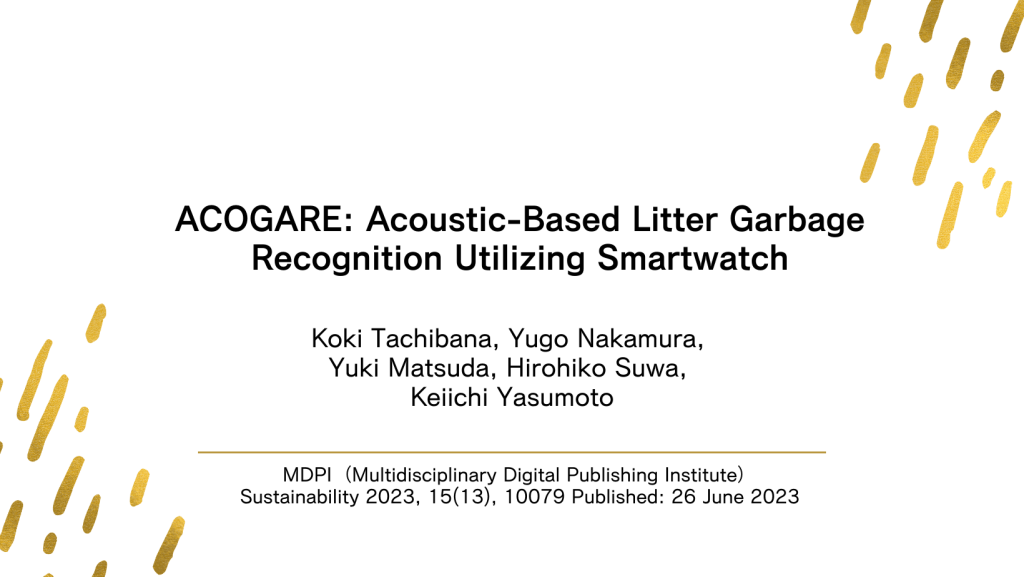国際ジャーナルMDPI 「Sustainability」に採択!
2023年6月29日 最終更新日時 : 2023年6月30日 Students

Multidisciplinary Digital Publishing Institute (MDPI) 「Sustainability」 に下記の論文が採択され, 6月23日に出版されました。
Koki Tachibana, Yugo Nakamura, Yuki Matsuda, Hirohiko Suwa, Keiichi Yasumoto
ACOGARE: Acoustic-Based Litter Garbage Recognition Utilizing Smartwatch Journal Article
In: Sustainability, vol. 15, no. 13, 2023.
@article{sust2023-tachibana,
title = {ACOGARE: Acoustic-Based Litter Garbage Recognition Utilizing Smartwatch},
author = {Koki Tachibana, Yugo Nakamura, Yuki Matsuda, Hirohiko Suwa, Keiichi Yasumoto},
url = {https://app.ait.kyushu-u.ac.jp/wp-content/uploads/2023/06/sustainability-15-10079.pdf},
doi = {10.3390/su151310079},
year = {2023},
date = {2023-06-26},
journal = {Sustainability},
volume = {15},
number = {13},
abstract = {Litter has become a social problem. To prevent litter, we consider urban planning, the efficient placement of garbage bins, and interventions with litterers. In order to carry out these actions, we need to comprehensively grasp the types and locations of litter in advance. However, with the existing methods, collecting the types and locations of litter is very costly and has low privacy. In this research, we have proposed the conceptual design to estimate the types and locations of litter using only the sensor data from a smartwatch worn by the user. This system can record the types and locations of litter only when a user raps on the litter and picks it up. Also, we have constructed a sound recognition model to estimate the types of litter by using sound sensor data, and we have carried out experiments. We have confirmed that the model built with other people’s data enabled to estimate the F-measure of 80.2% in a noisy environment through the experiment with 12 participants.},
keywords = {},
pubstate = {published},
tppubtype = {article}
}
Litter has become a social problem. To prevent litter, we consider urban planning, the efficient placement of garbage bins, and interventions with litterers. In order to carry out these actions, we need to comprehensively grasp the types and locations of litter in advance. However, with the existing methods, collecting the types and locations of litter is very costly and has low privacy. In this research, we have proposed the conceptual design to estimate the types and locations of litter using only the sensor data from a smartwatch worn by the user. This system can record the types and locations of litter only when a user raps on the litter and picks it up. Also, we have constructed a sound recognition model to estimate the types of litter by using sound sensor data, and we have carried out experiments. We have confirmed that the model built with other people’s data enabled to estimate the F-measure of 80.2% in a noisy environment through the experiment with 12 participants.


